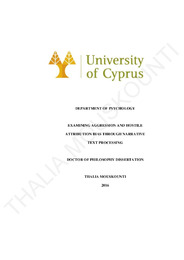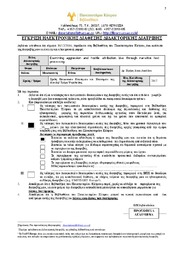| dc.contributor.advisor | Diakidoy, Ireni-Anna | en |
| dc.contributor.author | Mouskounti, Thalia N. | en |
| dc.coverage.spatial | Κύπρος | el |
| dc.coverage.spatial | Cyprus | en |
| dc.creator | Mouskounti, Thalia N. | en |
| dc.date.accessioned | 2017-01-30T11:39:07Z | |
| dc.date.accessioned | 2017-08-03T10:42:31Z | |
| dc.date.available | 2017-01-30T11:39:07Z | |
| dc.date.available | 2017-08-03T10:42:31Z | |
| dc.date.issued | 2016-12 | |
| dc.date.submitted | 2016-12-30 | |
| dc.identifier.uri | https://gnosis.library.ucy.ac.cy/handle/7/39503 | en |
| dc.description | Includes bibliographical references (p. 81-101). | en |
| dc.description | Number of sources in the bibliography: 175 | en |
| dc.description | Thesis (Ph. D.) -- University of Cyprus, Faculty of Social Sciences and Education, Department of Psychology, 2016. | en |
| dc.description | The University of Cyprus Library holds the printed form of the thesis. | en |
| dc.description.abstract | Προϋπάρχουσες έρευνες έχουν καταδείξει ότι άτομα με υψηλότερα επίπεδα επιθετικότητας συχνά εμφανίζουν προκατάληψη ως προς την επεξεργασία κοινωνικών πληροφοριών, ερμηνεύοντας τις προθέσεις των άλλων ως εχθρικές, ειδικά σε διφορούμενες και μη απειλητικές καταστάσεις. Αυτή η «εσφαλμένη απόδοση επιθετικής πρόθεσης» (hostile attribution bias) έχει πιθανολογηθεί ότι πηγάζει κυρίως είτε από κάτω προς τα πάνω (bottom-up) επεξεργασία ή από πάνω προς τα κάτω (top-down) επεξεργασία, με την προσοχή να εστιάζεται είτε σε εχθρικά ή σε άσχετα ερεθίσματα. Η παρούσα έρευνα εξέτασε το ζήτημα της κατανομής προσοχής, καθώς και την προέλευση της επιθετικότητας σε εφήβους, μέσω on-line μεθοδολογίας με τη χρήση διηγηματικών κειμένων και στα πλαίσια της «επίδρασης ασυμβατότητας» (contradiction effect). Εξετάστηκαν επίσης πιθανές συσχετίσεις μεταξύ της επιθετικότητας και της συναισθηματικής νοημοσύνης. Έφηβοι με υψηλότερα και χαμηλότερα επίπεδα «αντιδραστικής» και «ενεργητικής» επιθετικότητας διάβασαν διηγηματικά κείμενα τα οποία περιείχαν συμβατές και ασύμβατες προτάσεις οι οποίες περιέγραφαν τα χαρακτηριστικά του πρωταγωνιστή και τις ακόλουθες αντιδράσεις του, είτε ως ήπιες ή ως επιθετικές. Τα αποτελέσματα κατέδειξαν ότι και οι δύο τύποι της επιθετικότητας (αντιδραστική και ενεργητική), καθώς και η εσφαλμένη απόδοση επιθετικής πρόθεσης σχετίστηκαν γενικότερα με ταχύτερους χρόνους ανάγνωσης. Επίσης, η εσφαλμένη απόδοση επιθετικής πρόθεσης έτεινε να συσχετίζεται με την υπερεγρήγορση σε εχθρικά ερεθίσματα, πιθανόν λόγω από πάνω προς τα κάτω επεξεργασίας (top-down), και επίδρασης γνωστικού σχήματος. Ωστόσο, σε σχέση με προηγούμενες έρευνες, η αναμενόμενη «επίδρασης ασυμβατότητας» (contradiction effect) δεν βρέθηκε, ενώ, όπως αναμενόταν, υπήρξε αρνητική σύνδεση της συναισθηματικής νοημοσύνης με την επιθετικότητα και την εσφαλμένη απόδοση επιθετικής πρόθεσης. Περαιτέρω, εξετάσθηκαν οι συνέπειες αυτών των ευρημάτων σε σχέση με την ανάπτυξη αποτελεσματικών προγραμμάτων πρόληψης και παρέμβασης για την επιθετικότητα. | el |
| dc.description.abstract | Prior research has shown that individuals with higher levels of aggression often exhibit hostile attribution bias (HAB), by interpreting others’ intentions as hostile, especially in ambiguous and nonthreatening situations. Aggression and HAB have been hypothesized to be the outcome of either bottom-up or top-down processes, with attention allocated mainly on hostile or irrelevant cues. This study examined the issue of attention allocation, as well as the origins of aggression in adolescents, by employing an on-line narrative comprehension methodology in the context of a contradiction paradigm. Possible associations between aggression and trait emotional intelligence were also examined. Adolescents with higher and lower levels of reactive and proactive aggression read short stories containing consistent and inconsistent target sentences that described the main character’s attributes and reactions as either mild or aggressive. While both types of aggression (reactive and proactive) were related to faster reading times in general, reading trends suggested that HAB was related to hypervigilance to hostility, due to top-down, schema influences. However, the expected text-based contradiction effect demonstrated in previous studies was not found, while, as predicted, trait emotional intelligence was negatively linked to aggression and HAB. The implications of these findings with respect to the development of effective prevention and intervention programs are discussed. | en |
| dc.format.extent | iv, 127 p. ; 30 cm. | en |
| dc.language.iso | eng | en |
| dc.publisher | Πανεπιστήμιο Κύπρου, Σχολή Κοινωνικών Επιστημών και Επιστημών Αγωγής / University of Cyprus, Faculty of Social Sciences and Education | |
| dc.rights | info:eu-repo/semantics/openAccess | en |
| dc.rights | Open Access | en |
| dc.subject.lcsh | Aggressiveness in adolescence | en |
| dc.subject.lcsh | Aggressiveness in adolescence -- Prevention | en |
| dc.subject.lcsh | Anger in adolescence | en |
| dc.subject.lcsh | Emotional intelligence | en |
| dc.title | Examining aggression and hostile attribution bias through narrative text processing | en |
| dc.title.alternative | Η διερεύνηση της επιθετικότητας και της εσφαλμένης απόδοσης επιθετικής πρόθεσης μέσω της επεξεργασίας διηγηματικών κειμένων | el |
| dc.type | info:eu-repo/semantics/doctoralThesis | en |
| dc.contributor.committeemember | Διακίδου, Ειρήνη-Άννα | el |
| dc.contributor.committeemember | Φάντης, Κώστας | el |
| dc.contributor.committeemember | Σπανούδης, Γιώργος | el |
| dc.contributor.committeemember | Πετρίδης, Κωνσταντίνος | el |
| dc.contributor.committeemember | Diakidoy, Ireni-Anna | en |
| dc.contributor.committeemember | Fantis, Kostas | en |
| dc.contributor.committeemember | Spanoudis, George | en |
| dc.contributor.committeemember | Petridis, Konstantinos | en |
| dc.contributor.committeemember | Mason, Lucia | en |
| dc.contributor.department | Πανεπιστήμιο Κύπρου, Σχολή Κοινωνικών Επιστημών και Επιστημών Αγωγής, Τμήμα Ψυχολογίας | el |
| dc.contributor.department | University of Cyprus, Faculty of Social Sciences and Education, Department of Psychology | en |
| dc.subject.uncontrolledterm | ΕΠΙΘΕΤΙΚΟΤΗΤΑ | el |
| dc.subject.uncontrolledterm | ΕΣΦΑΛΜΕΝΗ ΑΠΟΔΟΣΗ ΕΠΙΘΕΤΙΚΗΣ ΠΡΟΘΕΣΗΣ | el |
| dc.subject.uncontrolledterm | ΕΠΕΞΕΡΓΑΣΙΑ ΚΟΙΝΩΝΙΚΩΝ ΠΛΗΡΟΦΟΡΙΩΝ | el |
| dc.subject.uncontrolledterm | ΕΠΕΞΕΡΓΑΣΙΑ ΚΕΙΜΕΝΟΥ | el |
| dc.subject.uncontrolledterm | ΣΥΝΑΙΣΘΗΜΑΤΙΚΗ ΝΟΗΜΟΣΥΝΗ | el |
| dc.subject.uncontrolledterm | AGGRESSION | en |
| dc.subject.uncontrolledterm | HOSTILE ATTRIBUTION BIAS | en |
| dc.subject.uncontrolledterm | SOCIAL INFORMATION PROCESSING | en |
| dc.subject.uncontrolledterm | TEXT PROCESSING | en |
| dc.subject.uncontrolledterm | TRAIT EMOTIONAL INTELLIGENCE | en |
| dc.identifier.lc | BF724.3.A34M68 2016 | en |
| dc.author.faculty | Σχολή Κοινωνικών Επιστημών και Επιστημών Αγωγής / Faculty of Social Sciences and Education | |
| dc.author.department | Τμήμα Ψυχολογίας / Department of Psychology | |
| dc.type.uhtype | Doctoral Thesis | en |
| dc.rights.embargodate | 2019-12-30 | |
| dc.contributor.orcid | Diakidoy, Ireni-Anna [0000-0003-3650-8108] | |


